Episode 7 of a series on heat pumps in existing buildings
To mitigate the consequences of climate change, a drastic decrease in CO2 emissions is essential. As part of the “European Green Deal”, European reduction targets were recently tightened from 40% to 55% by 2030. According to current studies, a 65% reduction in greenhouse gas emissions by 2030 is also required in Germany in order to achieve the goal of climate neutrality by 2050.
Decarbonizing the heat supply for buildings is a key lever for achieving these reduction targets. In addition to improving the refurbishment of building envelopes – and thus reducing heat demand – this also requires switching the heat supply in existing buildings as quickly as possible to technologies that emit as little CO2 as possible and are climate-neutral in the long term.
How much CO₂ emissions can heat pumps save compared to gas heating?
Heat pumps are a mature technology and can already replace fossil fuel-based heating systems (such as natural gas or fuel oil) on a large scale. For this reason, heat pumps are considered a key technology for heating of buildings for a future climate-neutral energy system.
The CO2 savings generated by electrically powered heat pumps depend on two factors: The CO2 intensity of the electricity and the efficiency of the heat pump. The first factor indicates how “clean” the electricity generation is, i.e., how many grams of carbon dioxide are emitted in providing one kilowatt-hour of electricity. This value varies between different regions and over time. However, meaningful average values can be given.
According to the Federal Environment Agency in Germany (Umweltbundesamt), the increase of wind and photovoltaics in the energy mix and the associated decline in coal-fired power generation reduced the specific emission factor in Germany from 764 g CO2/kWh to 401 g CO2/kWh between 1990 and 2019, the value for 2019 bases on preliminary and estimated data. In 2020, renewable sources exceeded 50% of the electricity generation for the first time in Germany. Thus, the trend towards clean electricity continues. For comparison, the average value for the EU28 countries is already below 300 g CO2/kWh.
The graph shows the reduction of CO2 emission due to heat pumps depending on their efficiency compared to the emissions of a gas boiler supported by a solar thermal system for domestic water heating. The calculation span is Germany in 2019 and 2030.
In the example “Germany 2019” a heat pump achieves a CO2 reduction starting with an efficiency of 1.7. In comparison, the average efficiency values of the air-source and ground-source heat pumps from the field test in existing buildings are significantly higher at 3.1 and 4.1, respectively (see episode 3 of this blog series). The CO2 savings for these values are over 44% and 58%, respectively.
Accordingly, heat pumps already save about half of the CO2 emissions compared to gas heating. Even the air-source heat pumps with the lowest annual efficiency of 2.5 still achieved CO2 savings of 33%. A recent evaluation of air source heat pumps for the two cold weeks of February this year showed an average efficiency of 2.3 for the 17 systems. Even if only cold winter weeks are considered, this still means 27% CO2 savings.
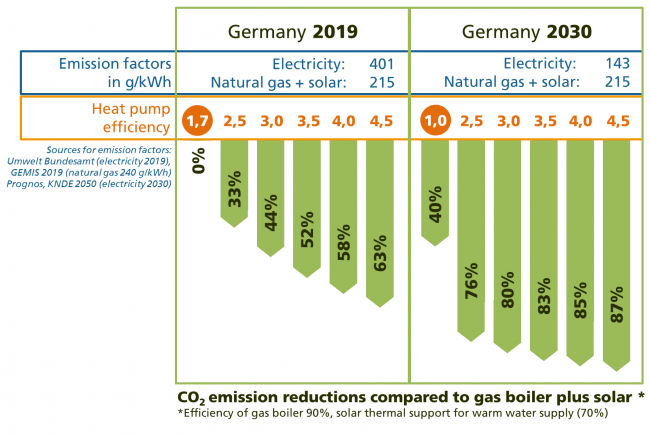
In the second example, “Germany 2030,” the emission factors for electricity generation were extrapolated from the current study “Climate Neutral Germany 2050“. According to the authors of Prognos, the emissions of electricity generation are 143 g CO2 per kWh in 2030. A heat pump with a rather low efficiency of 2.5 will then already achieve an emission saving of 76%. This value rises to almost 90% for more efficient heat pumps. In this scenario, even an electric heater with the efficiency of 1.0 already achieves 40% CO2 savings.
The graph illustrates one more aspect. The more efficient the heat pump or the lower the emission factor of electricity generation the less the CO2 savings grow when the efficiency increases. In numbers – a heat pump efficiency increases from 2.5 to 3.5 in 2019 accounts for just under 20% less CO2 emissions. An increase of 1.0 (from 3.5 to 4.5) in the same year reduces it by only about 10%. Since CO2 savings are at a very high level anyway in 2030, an increase of 2.0 (from 2.5 to 4.5) in heat pump efficiency results only in about 10% greenhouse gas reduction compared to 30% savings in 2019. However, as heat pump efficiency increases, electricity consumption decreases, which is also an important goal considering the operating costs and the limited potential for renewable electricity generation in Germany.
In other words, from a purely ecological perspective, heat pump efficiency will become less important in the future. However, this does not mean that efficiency will not remain important for the economic evaluation of heat pumps. We will address this issue in the next episode of this blog.
In summary: heat pumps lead to a significant reduction in CO2 emissions compared to fossil fuel heating systems, such as gas boilers. With the addition of renewable electricity generation, these savings will increase. The efficiency results from the field studies show that the savings are easily achievable in both new and old buildings.
This blog series is going on a two-week Easter break, before taking a closer look at heating costs in existing buildings in episode 8.
Further reading:
Overview on the range of applications for heat pumps.
Episode 5 of this series: How much does the use of back-up heaters reduce the efficiency of heat pumps?
Episode 6 of this series: How well have heat pumps performed in practice in partially refurbished and unrefurbished buildings?
Header picture: House with air-to-water heat pump. Reference building of Bundesverband Wärmepumpe (BWP) e.V. © BWP.
This blog post is financially supported by the Climate Neutrality Foundation.

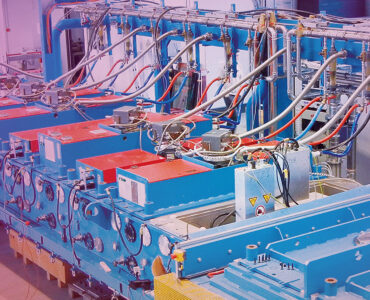

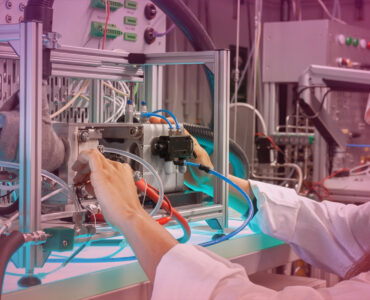



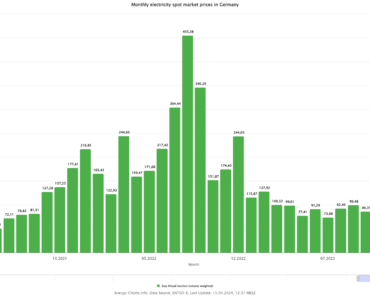
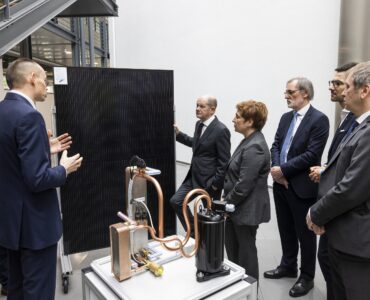





Add comment